Ammari H., Benkirane A., Touzani A. (editors) Recent Developments in Nonlinear Analysis
Подождите немного. Документ загружается.

December 28, 2009 12:15 WSPC - Proceedings Trim Size: 9in x 6in recent
290
Floquet states of periodically time-dependent harmonic
oscillators
Y. Achkar, S. Sayouri, and A. L. Marrakchi
Laboratoire de Physique Th´eorique et Appliqu´ee (LPTA)
D´epartement de Physique
Facult´e des Sciences Dhar-Mehraz
B.P. 1796, F´es-Atlas, F´es, Morocco
Floquet theory together with the resonating averages method (RAM) were used
to solve the Schr¨odinger equation of periodically-time-dependent harmonic os-
cillators. The approach gives another way of solving this equation, and lead
to identical analytical solutions to those published in the literature based on
different other methods.
Keywords: Time-dependent harmonic oscillator; Floquet operators; Floquet
states; Jump operators; Resonating averages method; Uncertainty relation.
1. Introduction
Numerous physical and mathematical studies have been devoted to the
construction of consistent formalism of explicitly time-dependent quantum
systems
1
-.
9
Among these quantum systems, the time-dependent harmonic
oscillator has attracted considerable interest in the past few decades
3
-,
1218
-
,
25
not only because it is a system that can be exactly solved and is con-
sidered as a great pedagogical tool, but also because it is a very relevant
system and possessing many applications in different areas of physics: quan-
tum optics, plasma physics, quantum field theory, gravitation, cosmology,
etc.
The harmonic oscillator with a time-dependent mass and a constant fre-
quency has been the subject of many researches
16
-,
1921
-.
25
Abdalla et al.
18
have studied this system in order to describe the electromagnetic field in-
tensities in a Fabry-Perot cavity. The harmonic oscillator with a constant
mass and a time-dependent frequency was used by Lemos et al.
20
in a the-
oretical approach of the expansion of the universe and by Paul
23
for the
December 28, 2009 12:15 WSPC - Proceedings Trim Size: 9in x 6in recent
291
discovery of electromagnetic traps for charged and neutral particles (known
as Paul-traps). In previous work,
24
we have introduced a direct theoretical
approach for solving the equations of motion of the time-dependent har-
monic oscillator, in Heisenberg picture, with some direct applications.
The purpose of this paper is to solve the Schr¨odinger evolution equation
of periodically-time-dependent harmonic oscillator. We have established a
theoretical approach based on the Floquet theory
1
combined with the res-
onating averages method elaborated by Lochak and Thiounn.
2
Hence,by
using the Floquet decomposition operators and developing the evolution
operator with the help of the resonating averages method from first order
to second ameliorated order, we have determinate the Floquet operators,
and Floquet states. Moreover, we have proposed a theoretical form of jump
operators between the instantaneous Floquet states, and verified the un-
certainty principle.
This paper is organized as follows: in the first part, we present the the-
oretical formalism of the purposed approach. In the second part, we apply
the method for the forced harmonic oscillator, the harmonic oscillator with
a time-dependent mass and a constant frequency, the harmonic oscillator
with a constant mass and a time-dependent frequency, and the harmonic
oscillator with a time-dependent mass and frequency. Some direct compar-
isons of our results with some published works are given,
3
,
59
-,
1218
2. Formalism
We consider a quantum system described by a time-dependent Hamiltonian
such as
H(t) = H
0
+ µH
1
(t) (1)
where H
0
is the Hamiltonian of the unperturbed oscillator, and H
1
(t) the
Hamiltonian of perturbation with amplitude µ.
2.1. Floquet approach
In the case of periodically time-varying Hamiltonian, the Floquet theorem
asserts the existence of an operator V (t), a fundamental solution of the
well-known Schr¨odinger evolution equation, in the form
1
V (t) = T (t)e
−iRt/~
(2)

December 28, 2009 12:15 WSPC - Proceedings Trim Size: 9in x 6in recent
292
Where T (t) is a periodic unitary operator of the same period as H
1
(t), and
R is a constant hermitian operator. The time-evolution operator can be
written as
U(t, t
0
) = V (t)V
−1
(t
0
) (3)
in the interaction picture it satisfies the following differential equation
i~
dU
I
(t, t
0
)
dt
= µH
I
(t)U
I
(t, t
0
) (4)
where
H
I
(t) = e
iH
0
t/~
(5)
According to the Floquet theorem, the Floquet states, solutions of the
Schr¨odinger equation, are defined as
|ψ
n
(t)i = T (t)|φ
n
(t)i (6)
where |φ
n
(t)i are the eigenstates of R, with the eigenvalues ε
n
, such as
i~
d|Φ
n
(t)i
dt
= R|Φ
n
(t)i (7)
and
|φ
n
(t)i = e
−iε
n
t/~
|ni (8)
|ni are the number states of the unperturbed system.
We notice that the fundamental propriety of those Floquet states is the
fact that they form a complet set of time-dependent solutions in the Hilbert
space. So, the global state |Ψ(t)i of the quantum system can be written in
the form of a linear combination of the |Ψ
n
(t)i :
|Ψ(t)i =
X
n
a
n
|Ψ
n
(t)i
where the a
n
are time-independent coefficients.
2.2. Jump operators
We introduce the operators A(t) and A
+
(t) which are responsible for the
instantaneous transitions between the Floquet states. Their effects on the
Floquet states are similar to those of the conventional annihilation and
creation operators. These operators must satisfy the conditions
3
A(t)|ψ
n
(t)i =
√
n|ψ
n−1
(t)i (9)
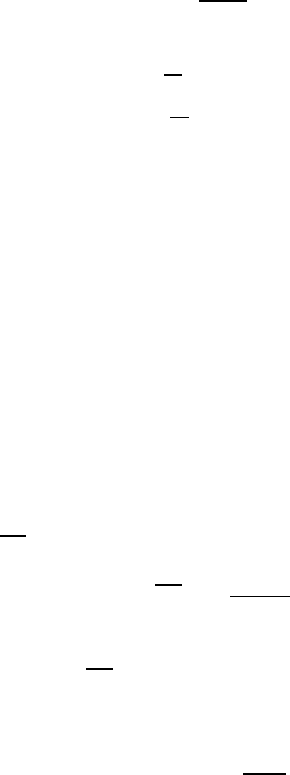
December 28, 2009 12:15 WSPC - Proceedings Trim Size: 9in x 6in recent
293
A
+
(t)|ψ
n
(t)i =
√
n + 1|ψ
n+1
(t)i (10)
So, their expressions are defined by the relations
A(t) = e
i
∆ε
~
t
T (t)aT
+
(t) (11)
A
+
(t) = e
−i
∆ε
~
t
T (t)a
+
T
+
(t) (12)
where ∆ε is the difference between two successive Floquet levels:
∆ε = ε
n+1
− ε
n
(13)
The Floquet decomposition (Eq. (2)) gives us different possibilities to solve
the evolution equation of the periodically-time-dependent harmonic oscil-
lator. However, the determination of the corresponding Floquet operators
is not unique, while the Floquet theory supposes the existence of an infi-
nite number of couples (R, T (t)), solutions of equation (2), depending on
the form of the perturbed Hamiltonian. To determine these two operators,
we used the technique of the resonating averages method elaborated by
G.Lochak,
2
based on the generalized Bogoliubov approximation.
2.3. Resonating averages method (RAM)
The principle of this method consists in the separation of the perturbed
Hamiltonian H
I
(t), written in the interaction picture (Eq. (5)), into an
averaging part,
H
I
(t), and an oscillating part
f
H
I
(t), such as :
H
I
(t) = H
I
(t) +
d
f
H
I
(t)
dt
(14)
with
H
I
(t) =
n−1
X
k=0
(H
I
)
k
e
iw
k
t
(15)
and
f
H
I
(t) =
∞
X
k=n
(H
I
)
k
e
iw
k
t
iw
k
(16)
where (H
I
)
k
are a set of constant hermitian operators, and w
k
a frequency
sequence from which one can extract a subsequence which contains the fre-
quency w
0
= 0.
The RAM stipulates that if one supposes that this subsequence contains
a set of a finite number n of frequencies as {w
0
, w
1
, ..., w
n−1
}, the other
frequencies {w
n
, w
n+1
, ...etc} are not harmonic or harmonic combinations
of the n first frequencies.
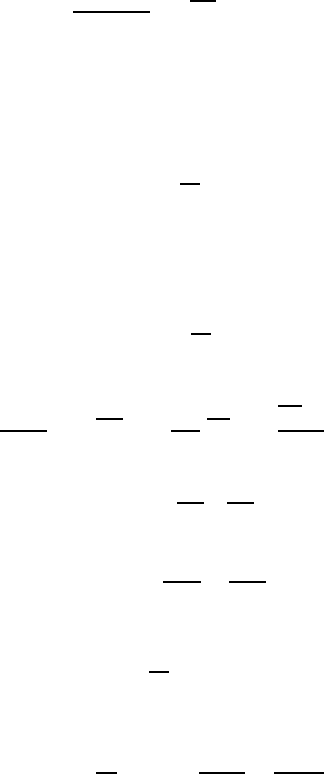
December 28, 2009 12:15 WSPC - Proceedings Trim Size: 9in x 6in recent
294
2.3.1. First order and first order ameliorated solutions
The application of the RAM to Eq. (4), to first order of µ, gives the differ-
ential equation
i~
d
(1)
V
I
(t)
dt
= µ
H
I
(t)
(1)
V
I
(t) (17)
With the initial condition
(1)
V
I
(t
0
) = 1, one has
(1)
U
I
(t) =
(1)
V
I
(t) =
(1)
T (t)e
−i
(1)
Rt/~
(18)
The first order ameliorated solution is defined as
(1a)
U
I
(t) = [1 −
iµ
~
f
H
I
(t)]
(1)
V
I
(t) (19)
2.3.2. Second order and second order ameliorated solutions
The second order fundamental solution of Eq. (4) is defined by the operator
(2)
U
I
(t) = [1 −
iµ
~
f
H
I
(t)]Γ(t) (20)
where Γ(t) is an unitary operator solution of :
i~
dΓ(t)
dt
= {µ
H
I
(t) +
iµ
2
~
[
S
I
(t) +
Z
I
(t)
2
]}Γ(t) (21)
where
S
T
(t) =
f
H
I
H
I
− H
I
f
H
I
(22)
Z
I
(t) =
f
H
I
d
f
H
I
dt
−
d
f
H
I
dt
f
H
I
(23)
One may define the second order ameliorated solution as
(2a)
U
I
(t) = [1 −
iµ
~
f
H
I
(t) + µ
2
A
2
(t)]Γ(t) (24)
where the operator A
2
(t) is given by
A
2
(t) =
1
~
2
{
f
S
I
(t) +
f
Z
I
(t)
2
−
f
H
2
I
(t)
2
} (25)
Determination of first and second order ameliorated solutions
(1a)
U
1
(t)
and
(2a)
U
1
(t) (Eqs. (19) and (24)) enables to obtain the first and sec-
ond order couples (
(1a)
R,
(1a)
T (t)), (
(2a)
R,
(2a)
T (t)) and Floquet-states
|
(1a)
ψ
n
(t)i, |
(2a)
ψ
n
(t)i, respectively.
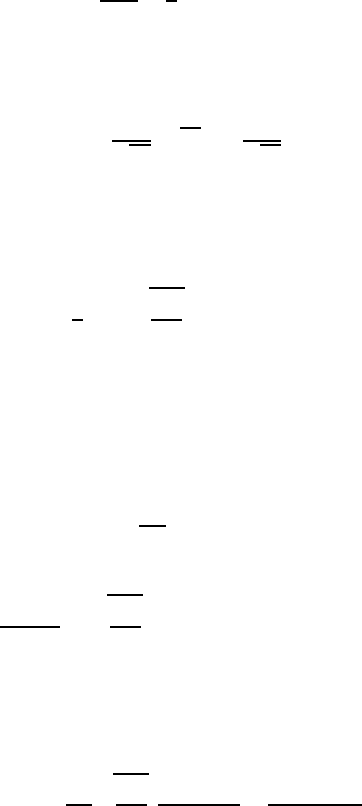
December 28, 2009 12:15 WSPC - Proceedings Trim Size: 9in x 6in recent
295
3. Applications
3.1. Forced harmonic oscillator (FHO)
We have applied the above method, and compared our results to those
of other studies,
39
-
12
which have used other methods, to a FHO with the
following Hamiltonian
H(t, ν
0
) =
p
2
2m
0
+
1
2
m
0
ω
2
0
q
2
+ µ sin(ν
0
t)q (26)
where m
0
and ω
0
are the constants describing the mass and the frequency
of the unperturbed oscillator, respectively.
By introducing the annihilation operator a
a =
1
√
2~
(
p
β
0
q + i
p
√
β
0
) (27)
where
β
0
= m
0
ω
0
(28)
the quantized form of H(t) is
H(t, ν
0
) = ~ω
0
(a
+
a +
1
2
) + µ
s
~
2β
0
(a + a
+
) sin ν
0
t = H
0
+ µH
1
(t) (29)
We applied the RAM to the perturbed Hamiltonian H
I
(t), expressed in the
interaction picture as Eq. (5), choosing a frequency sequence such as
ω
k
= 0, ν
0
− 2ω
0
, −(ν
0
− 2ω
0
) (30)
we deduced from Eq. (29) the averaging and oscillating parts of H
I
(t), given
respectively by
H
I
(t) = 0 (31)
and
d
f
H
I
(t)
dt
=
s
~
2β
0
sin ν
0
t(e
−iω
0
t
a + e
iω
0
t
a
+
) (32)
Then
f
H
I
(t) = α
0
(t)a + α
∗
0
(t)a
+
(33)
where
α
0
(t) =
−1
2
s
~
2β
0
(
e
i(ν
0
−ω
0
)t
ν
0
− ω
0
+
e
−i(ν
0
+ω
0
)t
ν
0
+ ω
0
) (34)
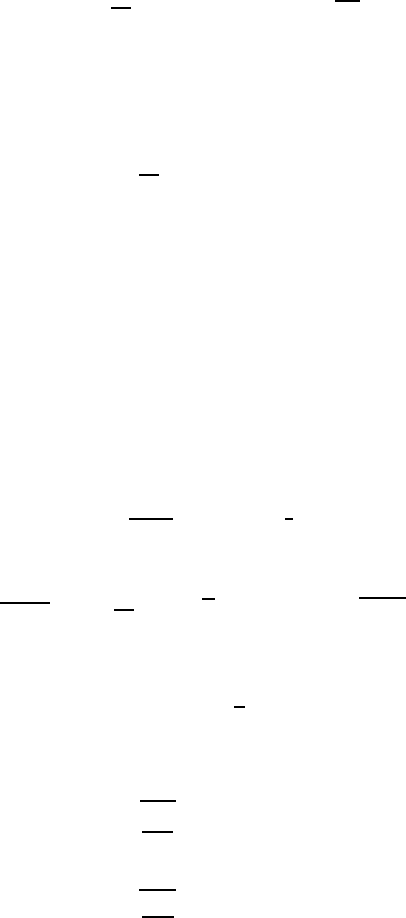
December 28, 2009 12:15 WSPC - Proceedings Trim Size: 9in x 6in recent
296
3.1.1. First order calculations
The fundamental first order ameliorated solution of Eq. (4) is obtained as
(1a)
U(t) = {1 −
iu
~
(α
1
(t)a + α
∗
1
(t)a
+
)}e
−i
H
0
t
~
(35)
where
α
1
(t) = e
iω
0
t
α
0
(t) (36)
From Eq. (2), we deduced the Floquet operators such as
(1a)
T (t) = 1 −
iu
~
(α
1
(t)a + α
∗
1
(t)a
+
) (37)
(1a)
R = H
0
(38)
The ameliorated first order operator
(1a)
R is simply equal to the unper-
turbed Hamiltonian H
0
.
This absence of first order linear effects in is one of the characteristic
properties of the Floquet Hamiltonian. This fact follows directly from the
perturbative approach applied to the unitary operator (Eq. (19)). However,
it was shown that the phenomenon is deeper for a large class of field pulses
which are not necessarily monochromatic, and all odd perturbative correc-
tions must vanish
13
-,
1426
Then, the eigenstates of the Floquet operator
(1a)
R are obtained as
|
(1a)
Φ
n
(t)i = e
−i
(1a)
Rt
~
|ni = e
−i(n+
1
2
)ω
0
t
|ni (39)
and the Floquet states are given by the following expression
|
(1a)
Ψ
n
(t)i = e
−i
(1a)
ε
n
t
~
{|ni −
iµ
~
[α
1
(t)
√
n|n −1i + α
∗
1
(t)
√
n + 1|n + 1i]}
(40)
where
(1a)
ε
n
= ~ω
0
(n +
1
2
) (41)
To determine the expectation values and the uncertainty relation of the
position and impulsion operators, one can write
q =
s
~
2β
0
(a + a
+
) (42)
p =
r
~β
0
2
(a
+
− a)
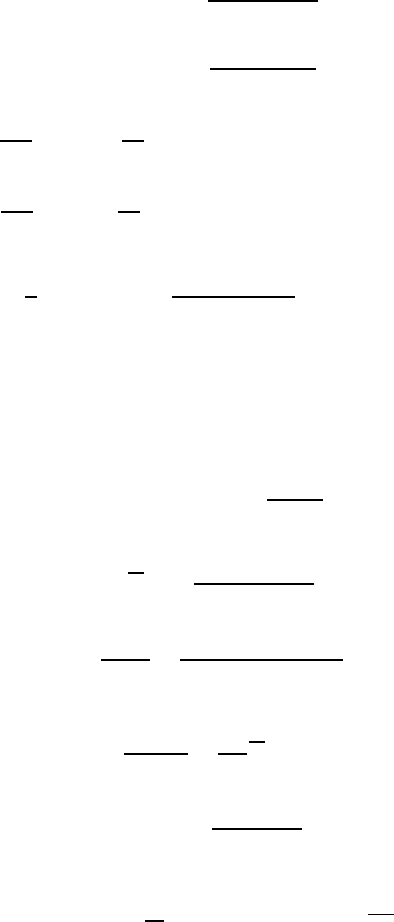
December 28, 2009 12:15 WSPC - Proceedings Trim Size: 9in x 6in recent
297
The first ameliorated order expectation values of q, p, q
2
and p
2
in the
Floquet states, given by Eq. (40), are
h
(1a)
qi =
−µ sin ν
0
t
m
0
(ν
2
0
− ω
2
0
)
(43)
h
(1a)
pi =
−µν
0
cos ν
0
t
ν
2
0
− ω
2
0
(44)
h
(1a)
q
2
i =
~
2β
0
{2n + 1 +
µ
2
~
2
[2n(n + 1)Re(α
2
1
) + ((2n + 1)
2
+ 2)|α
1
|
2
]} (45)
h
(1a)
p
2
i =
~β
0
2
{2n+1+
µ
2
~
2
[−2n(n+1)Re(α
2
1
)+((2n+1)
2
+2)|α
1
|
2
]} (46)
The explicit expression of the uncertainty product is
(1a)
h∆q∆pi =
~
2
(2n + 1){1 + µ
2
(2n + 1)
~β
0
(ν
2
0
− ω
2
0
)
2
(ν
2
0
cos
2
ν
0
t + ω
2
0
sin
2
ν
0
t)}
1/2
(47)
3.1.2. Second order calculations
To solve the differential equation (21), we begin by expressing the operator
Z(t) in the form
Z(t) = 2Im(α
0
(t)
dα
∗
0
(t)
dt
) (48)
Then, we deduce its averaging and oscillating parts as
Z(t) =
−i~
2m
0
(ν
2
0
− ω
2
0
)
(49)
d
e
Z(t)
dt
=
i~(e
2iν
0
t
+ e
−2iν
0
t
)
4m
0
(ν
2
0
− ω
2
0
)
(50)
Because H
I
= 0 and S
I
= 0,Eq. (21) is reduced to
i~dΓ(t)
dt
=
iµ
2
2~
Z(t)Γ(t) (51)
So, we deduce
Γ(t) = e
−iµ
2
t
4~m
0
(ν
2
0
−ω
2
0
)
(52)
Then, the second order evolution operator is given by
(2)
U(t) = {1 −
iu
~
(α
1
(t)a + α
∗
1
(t)a
+
)}e
−i
H
0
t
~
Γ(t) (53)

December 28, 2009 12:15 WSPC - Proceedings Trim Size: 9in x 6in recent
298
and the corresponding Floquet components are
(2)
R = ~ω
0
(a
+
a +
1
2
) +
µ
2
4m
0
(ν
2
0
− ω
2
0
)
(54)
(2)
T (t) = 1 −
iu
~
(α
1
(t)a + α
∗
1
(t)a
+
) =
(1a)
T (t) (55)
The ameliorated second order solution is
(2a)
U
I
(t) = {1 −
iu
~
f
H
I
(t) + µ
2
A
2
(t)}Γ(t) (56)
with
A
2
(t) =
1
~
2
(
e
S(t) +
e
Z(t) −
f
H
2
I
(t)
2
) (57)
By integrating Eq. (50), we get
e
Z(t) =
~(e
2iν
0
t
− e
2iν
0
t
)
8m
0
ν
0
(ν
2
0
− ω
2
0
)
(58)
then,
(2a)
U(t) = {1 −
iu
~
(α
1
(t)a + α
∗
1
(t)a
+
) −
u
2
2~
2
(ϕ(t)
+α
2
1
(t)a
2
+ α
∗2
1
(t)a
+2
+ |α
1
|
2
(2a
+
a + 1))}e
−i
(2a)
Rt/h
(59)
where
ϕ(t) =
−i~ sin ν
0
t cos ν
0
t
2m
0
ν
0
(ν
2
0
− ω
2
0
)
(60)
The ameliorated second order Floquet-Hamiltonian has the following form
(2a)
R = ~ω
0
(a
+
a +
1
2
) +
µ
2
4m
0
(ν
2
0
− ω
2
0
)
(61)
(2a)
T = 1 −
iu
~
(α
1
(t)a + α
∗
1
(t)a
+
) −
u
2
2~
2
(ϕ(t) + α
2
1
(t)a
2
+α
∗2
1
(t)a
+2
+ |α
1
|
2
(2a
+
a + 1))
(62)
In the same way, we determined the ameliorated second order Floquet states
|
(2a)
Ψ
n
(t)i =
(2a)
T |
(2a)
Φ
n
(t)i (63)
where
|
(2a)
Φ
n
(t)i = e
−i
(2a)
Rt/~
|ni = e
−i
(2a)
ε
n
t/~
|ni (64)
and the quasi-energy is
(2a)
ε
n
= ~ω
0
(n +
1
2
) +
µ
2
4m
0
(ν
2
0
− ω
2
0
)
(65)

December 28, 2009 12:15 WSPC - Proceedings Trim Size: 9in x 6in recent
299
The explicit expression of the Floquet states is
|
(2a)
Ψ
n
(t)i = {[1 + ϕ(t) −
µ
2
2~
2
(2n + 1)|α
1
|
2
]|ni
−
iµ
~
[α
1
(t)
√
n|n −1i + α
∗
1
(t)
√
n + 1|n + 1i]
(66)
−
µ
2
2~
2
[α
2
1
(t)
p
n(n −1)|n − 2i + α
∗2
1
(t)
p
(n + 1)(n + 2)|n + 2i]}e
−i
(2a)
ε
n
t
~
Let us notice that the expression of the ameliorated second order Floquet
operator
(2a)
T (t), given by Eq. (62), is comparable to the so-called coher-
ent states generator published by Breuer et al.,
3
and by Fox et al.,
9
as well
as the ameliorated second order Floquet states. The detailed comparisons
with these works accompanied with some discussions are given in section
3.1.4.
Moreover, the expression of the quasi-energy (Eq. (65)) is identical to that
given in some other works,
39
-
13
which supports the observations previously
made. Consequently, the corrections are absent to first order but appear,
when the approximations are pushed to second order, and are expressed by
a shift D
ε
given by
D
ε
=
µ
2
4m
0
(ν
2
0
− ω
2
0
)
(67)
which does not depend on the quantum number n, but on the strength µ
and the pulsation ν
0
of the interacting field. This means effect of the per-
turbation is as a whole spectral shift of all Floquet levels.
This ∆ε is giving by
∆ε = ε
n+1
− ε
n
(68)
The sense of displacement depends on the sign of D
ε
.If D
ε
> 0 , the levels
shift up and inversely they shift down if D
ε
< 0.
Therefore, the frequency of a transition of the Floquet states, which corre-
sponds to an absorption or emission of the so-called ”Floquet quanta”,
14
is
equal to that of the stationary states. So, we can write
(2a)
∆ε = ~
(2a)
ω
F
(69)
and
(2a)
ω
F
= ω
0
(70)
